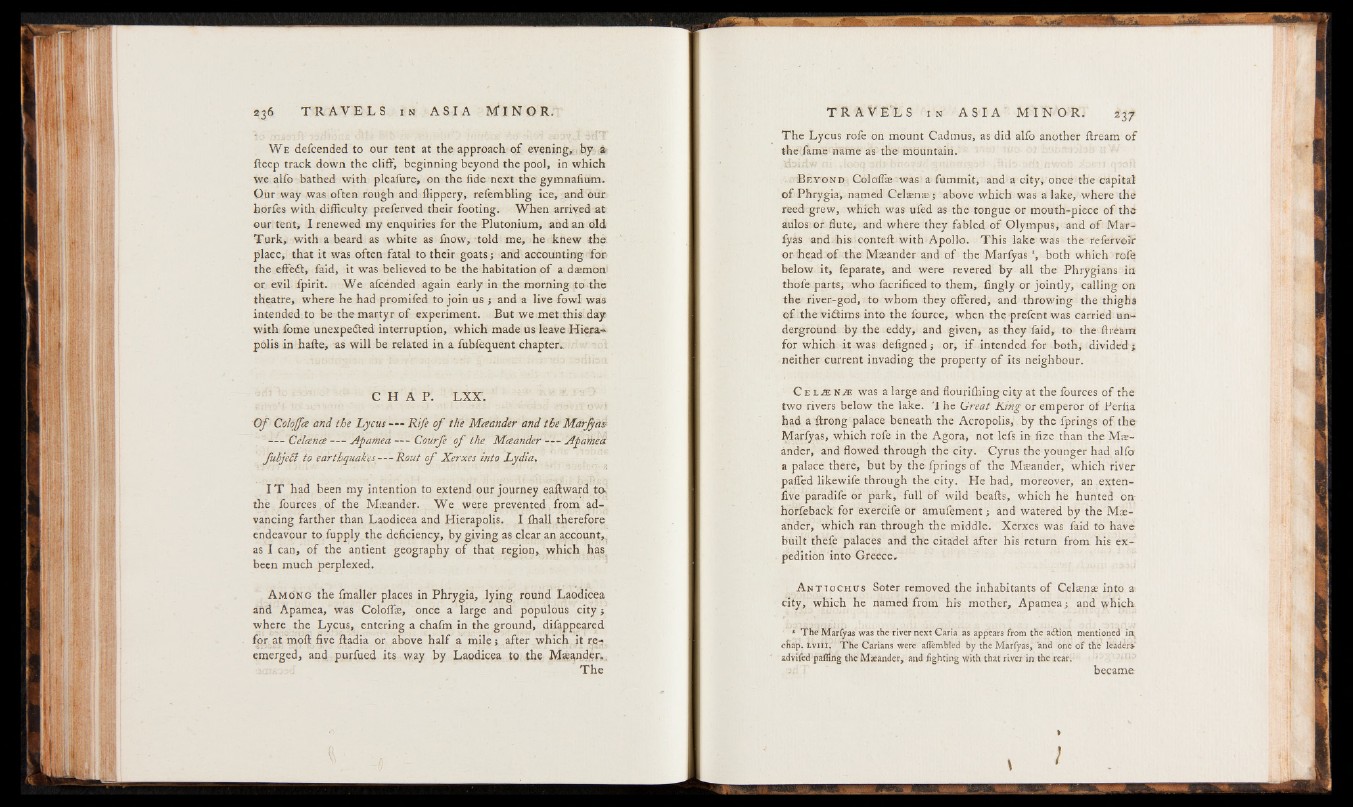
W e defcended to our tent at the approach of evening,, by a
fteep track down the cliff, beginning beyond the pool, in which
We alfo bathed with pleafure, on the fide next the gymnafium.
Our way was often rough and flippery, refembling ice, and our
horfes with difficulty preferved their footing. When arrived at
our tent, I renewed my enquiries for the Plutonium, and an old
Turk, with a beard as white as fnow, told me, he knew the:
place, that it was often fatal to their goats; and accounting for
the effedt, faid, it was believed to be the habitation of a daemon
or evil fpirit. We afcended again early in the morning to the
theatre, where he had promifed to join us ; and a live fowl was
intended.to be the martyr of experiment. But we met this day
with fome unexpected interruption, which made us leave Hiera-
polis in hafte, as will be related in a fubfequent chapter.
C H A P . LXX.
O f Colojfa and the Lycus — Rife of the Meeander and the Marjyasb
— Celance — Apamea — Courfe o f the Meeander - -- Apamea
fubjehl to earthquakes— Rout of Xerxes into Lydia.
I T had been my intention to extend our journey eaftward tos
the fources of the Moeander. We were prevented from ad-,
vancing farther than Laodicea and Hierapolis. I fhall therefore
endeavour to fupply the deficiency, by giving as clear an account,,
as I can, of the antient geography of that region, which has
been much perplexed.
A mong the fmaller places in Phrygia, lying round Laodicea
and Apamea, was Coloflae, once a large and populous city;
where the Lycus, entering a chafm in the ground, difappeared
for at moft five ftadia or above half a mile; after which it re-
emerged, and purfued its way by Laodicea to the Mae^nder.
The
237
The Lycus rofe on mount Cadmus, as did alfo another flream of
thefame name as the mountain.
B e y o n d Coloflb was a fummit, and a city, once the capital
of Phrygia, named Celaenae; above which was a lake, where the
reed grew, which was ufed as the tongue or mouth-piece of the
aulos or flute, and where they fabled of Olympus, and of Mariyas
andhiscontefl with Apollo. This lake was the refervoir
or head of the Maeander and of the Marfyas ', both which rofe
below it, feparate, and were revered by all the Phrygians iri
thofe parts, who facrificed to them, fingly or jointly, calling on
the river-god, to whom they offered, and throwing the thighs
effithe vidtims into the fource, when the prefent was carried underground
by the eddy, and given, as they faid, to the flream
for which it was defigned; or, if intended for both, divided ;
neither current invading the property of its neighbour.
C e lje hje was a large and flourifhing city at the fources of the
two rivers below the lake. The Great King or emperor of Perfia
had a ftrong palace beneath the Acropolis, by the fprings of the
Mariyas, which rofe in the Agora, not lefs in fize than the Maeander,
and flowed through the city. Cyrus the younger had alfo
a palace there, but by the fprings of the Maeander, which river
paffed likewife through the city. He had, moreover, an exten-
five paradife or park, full of wild beafts, which he hunted on-
horfeback for exercife or amufement; and watered by the Maeander,
which ran through the middle. Xerxes was faid to have
built thefe palaces and the citadel after his return from his expedition
into Greece,
A n t t o c h u s Soter removed the inhabitants of Celaenae into a:
city, which he named from his mother, Apamea; and which
1 The Marfyas was the river next Caria as appears from the a&ion mentioned
chap, lviii. The Carians were aflembled by the Marfyas, and one of the leader»
advifed palling the Maeander* and lighting with that river in the rear.
-v 1 became